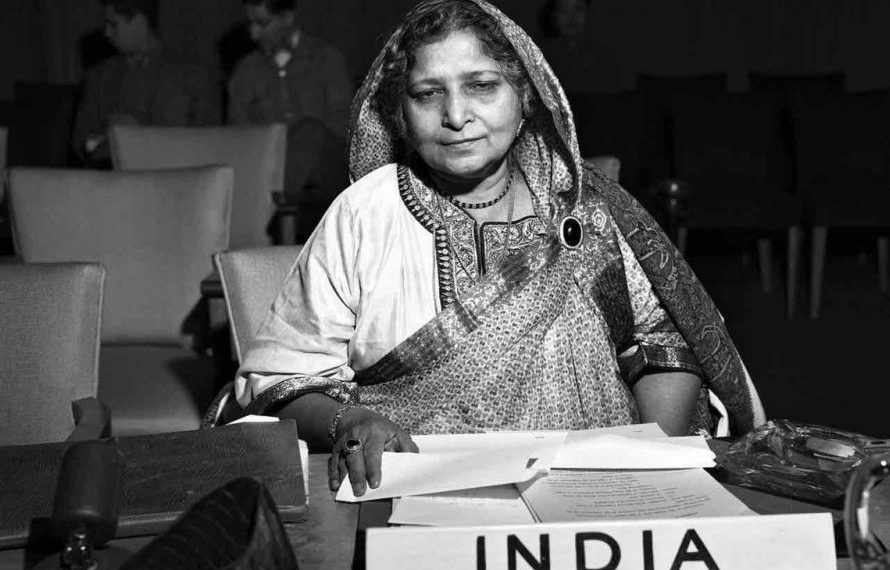The following essay revisits the life and legacy of a largely neglected Indian liberal, Shareefa Hamid Ali. A prominent advocate of an intersectional approach to feminism and individual rights, Ali was the president of the All India Women’s Conference and a founding member of the United Nations Commission on the Status of Women.
We often come across inspiring tales of those who have made a mark in Indian history. Seldom, however, are these tales of women. Does this mean women were largely absent from Indian public spheres and hardly ever took on leadership roles? Or have they been neglected in Indian political and social history? The latter seems more plausible. A prey to such negligence have been the contributions of Shareefa Hamid Ali.
Ali was born on December 12, 1883, to a progressive Muslim family in Gujarat. Surrounded by family members whose ideologies were inherently liberal, Ali grew up with similar beliefs and ideas. Her father Abbas J. Tyabji, an Indian freedom fighter who also served as the Chief Justice of Baroda state (now known as Vadodara), and her mother Ameena Tyabji, among the first and most prominent Muslim women to disavow purdah, sowed the liberal seeds of individuality and justice in the mind of young Ali.
Ali, like her mother, also explicitly disavowed the practice of purdah as she believed that the practice concealed a woman’s individuality and personality both literally and metaphorically.
Owing to her parents’ liberal outlook, Ali was among the few fortunate women who received an education at the time. She became well versed in Urdu, Marathi, Persian, French, and English.
Her political interests and ideas of justice and women’s emancipation came to the forefront when she attended a session of the Indian National Congress in 1907. The session focused on the Swadeshi movement, which piqued Ali’s interest. It also encouraged her to work for the women of her community and the disadvantaged and marginalised sections of society.
Ali also helped improve access to health and education for the marginalised and neglected by teaching them about their right to education and healthcare. She firmly believed that to break the shackles of societal categories it was important for people to recognize their individual rights and value their personal liberty. Ali believed the same could be achieved through education.
As a mother of seven daughters, two of whom had fallen prey to child marriages, Ali argued for a minimum marriageable age of 18 years for women. She organised a campaign in Sindh to support to mobilising Muslim women against child marriage. At the campaign, Ali argued that child marriage restricts women from identifying their individuality and often denies them their basic right to education. The campaign was supported by women from all sections of society. The movement was met with success and the Sarda Act (Child Restraint Act, 1929), aimed at enforcing 21 years and 18 years as the minimum marriageable age for men and women respectively, was passed on 28 September 1929. This was the first legislation in India for the minimum age of marriage.
Ali, being a prominent leader in the Indian independence movement, was also a part of various organisations and committees that worked towards women’s emancipation. She was the president of the All India Women’s Conference (AIWC). The organisation aims to improve education for women and children. It also focuses on women’s rights. Through this organisation, Ali gave her ideas of women’s education a wider platform, not limited to India. She represented the organisation at the Istanbul Congress of the International Alliance of Women. By representing her country on an international platform, Ali marked her presence as a woman seeking basic rights for all women. She also brought to the forefront the presence of different kinds of feminism often separated by regions and countries.
By not limiting feminism to a one-dimensional view and understanding the role of intersectionality in feminism, Ali inspired one to look beyond one’s own social position in society and adopt a more inclusive lens.
Ali was also appointed to a women’s sub-committee of the National Planning Committee in 1939. The sub-committee adopted an intersectional approach to women’s upliftment, reviewing social, economic, and legal status of Indian women. Ali represented Muslim women at the committee. She believed that to recommend measures of equal opportunity it was important to have representatives from all communities. It is only when violations of individual rights, and by extension violations against the rights of communities, are identified can a society achieve equality in all contexts.
In 1947, Ali represented India as one of the fifteen founding members the first United Nations Commission on the Status of Women. Ali, alongside other delegates from all around the world established the guiding principles of the Commission. Needless to say, Ali brought her ideas of inclusivity while drafting the principles. The principles include the idea of raising the status of women irrespective of nationality, race, language and religion. These principles continue to guide the functioning of the Commission. Its presence can also be found in the principles of the United Nations Universal Declaration of Human Rights.
An ardent advocate of individual, human and women’s rights, Ali paved the way for younger generations of women to live their lives on their terms.


